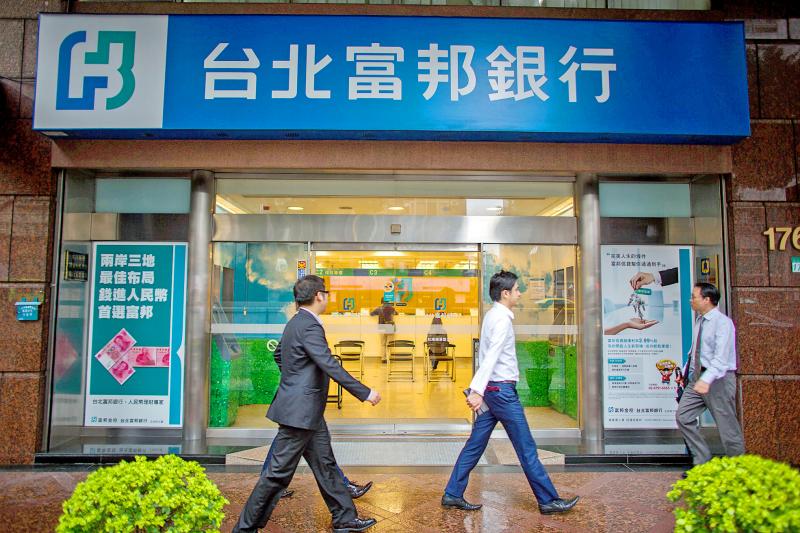Jih Sun Financial Holding Co (日盛金控) has suggested that its shareholders reconsider selling their shares to Fubon Financial Holding Co (富邦金控), saying that Fubon’s offer of NT$13 per share is too low.
The company’s response to a tender offer begun last month by Fubon Financial emerged in a regulatory filing late on Tuesday, which said that its larger rival’s offer represented a premium of just 4.9 percent over Jih Sun’s net asset value per share of NT$12.39 at the end of September last year.
Although Fubon said in its tender offer prospectus that it took “control premiums” into account when setting the price, it did not consider synergy in the acquisition and thus underestimated the Taipei-based company’s value, Jih Sun said in the filing.

Photo: Lam Yik Fei, Bloomberg
Control premium is the amount that a buyer is willing to pay over the current market price of a publicly traded company to acquire a controlling share in the company.
Jih Sun has assigned A-Plus CPA Firm (明喆聯合會計師事務所) and KW CPAs Firm (高威聯合會計師事務所) to act as independent experts and review whether Fubon’s bid is reasonable, it said, adding that the accounting firms concluded their reviews on Monday.
In calculating Jih Sun’s fair value, A-Plus CPA estimated that each common stock is worth NT$13.89 to NT$15.71 — higher than Fubon’s bid price, Jih Sun said.
Using other valuation approaches — such as market approach, market price method and asset approach — the accounting firms estimated a reasonable bid price to range from NT$9.63 to NT$16.93, Jih Sun said.
As the independent experts considered Fubon’s bid unreasonable, Jih Sun’s board members recommended that shareholders carefully consider whether to sell their shares to Fubon, it said.
Besides the low bid price, Fubon Financial did not lay out how it would take care of Jih Sun’s employees, it said, adding that if Fubon terminated some of Jih Sun’s operations and dismissed employees, many households would be affected.
Jih Sun did not have the opportunity to negotiate with Fubon before the tender offer was announced, because it is a hostile takeover, so Jih Sun is uncertain how the acquisition would affect its business, customer relations and staff, it said.
The filing came after Jih Sun’s board convened a meeting on Tuesday attended by all eight directors and three independent directors.
Fubon Financial, which began the public tender offer on Dec. 22, said that the acquisition would create a win-win situation for Jih Sun’s shareholders, customers and employees, and urged the shareholders to sell.
Its bid price represented a premium of 24.8 percent over Jih Sun’s average closing price over the 20 trading days before Dec. 18, Fubon Financial said, adding that the premium is similar to other public tender offers conducted in Taiwan.

Among the rows of vibrators, rubber torsos and leather harnesses at a Chinese sex toys exhibition in Shanghai this weekend, the beginnings of an artificial intelligence (AI)-driven shift in the industry quietly pulsed. China manufactures about 70 percent of the world’s sex toys, most of it the “hardware” on display at the fair — whether that be technicolor tentacled dildos or hyper-realistic personalized silicone dolls. Yet smart toys have been rising in popularity for some time. Many major European and US brands already offer tech-enhanced products that can enable long-distance love, monitor well-being and even bring people one step closer to

Malaysia’s leader yesterday announced plans to build a massive semiconductor design park, aiming to boost the Southeast Asian nation’s role in the global chip industry. A prominent player in the semiconductor industry for decades, Malaysia accounts for an estimated 13 percent of global back-end manufacturing, according to German tech giant Bosch. Now it wants to go beyond production and emerge as a chip design powerhouse too, Malaysian Prime Minister Anwar Ibrahim said. “I am pleased to announce the largest IC (integrated circuit) Design Park in Southeast Asia, that will house world-class anchor tenants and collaborate with global companies such as Arm [Holdings PLC],”

Thousands of parents in Singapore are furious after a Cordlife Group Ltd (康盛人生集團), a major operator of cord blood banks in Asia, irreparably damaged their children’s samples through improper handling, with some now pursuing legal action. The ongoing case, one of the worst to hit the largely untested industry, has renewed concerns over companies marketing themselves to anxious parents with mostly unproven assurances. This has implications across the region, given Cordlife’s operations in Hong Kong, Macau, Indonesia, the Philippines and India. The parents paid for years to have their infants’ cord blood stored, with the understanding that the stem cells they contained

Sales in the retail, and food and beverage sectors last month continued to rise, increasing 0.7 percent and 13.6 percent respectively from a year earlier, setting record highs for the month of March, the Ministry of Economic Affairs said yesterday. Sales in the wholesale sector also grew last month by 4.6 annually, mainly due to the business opportunities for emerging applications related to artificial intelligence (AI) and high-performance computing technologies, the ministry said in a report. The ministry forecast that retail, and food and beverage sales this month would retain their growth momentum as the former would benefit from Tomb Sweeping Day